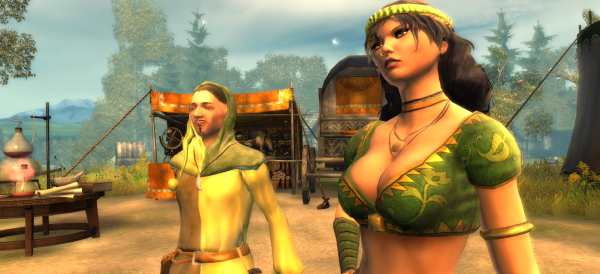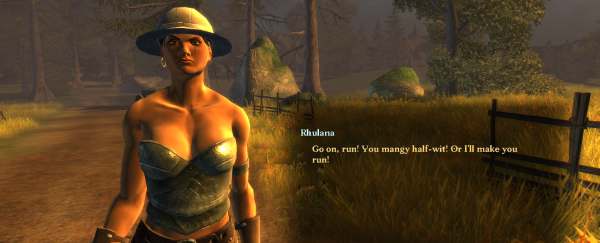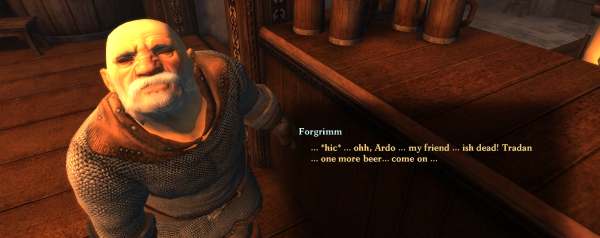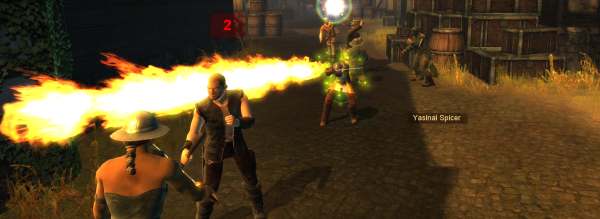The Lower Classes: Drakensang Impressions
Given infinite time and money (instead of very little time and enough money to buy a rusty dagger from a passing kobold), Drakensang is the sort of thing we'd give the full Wot I Think treatment to. Unfortunately, with it coming out this week, there's no time to give this epic German RPG the time it requires to really measure up its merits in a timely fashion. Rather than leaving this particular dungeon unexplored, I thought I'd spend a few hours with it - like, the first 4-5 or so - and give it a quick eye-of-Sauron over. So I did!
You'll find it beneath the cut, along with far less wince-worthy fantasy gags.
Well, at least less.
First impressions?
Okay, here's the first lady you talk to.
This is the third.
(The grab's from later in the game. The character doesn't come with the fancy hat. I added that. The things you do for an incy armour boost)
Yes, it's a fantasy role-playing game. Which everyone knows, means push-up bras. Drakensang is comfortable with its existence as a FRPG. It never tries to be anything else.
But no, it's not going to be one of those slightly-strained "Oh, God, this is so immature/sexist/whatever" sort of pieces of eye-rolling. It's just making clear everyone understands that this isn't a progressive smart forward-looking RPG. This is an RPG which embraces the conventions of the genre with every part of its body and soul. Its read the Dragonlance books. It cried when Flint died. It cares deeply about that Spoiler. In the five hours I've played, I've faced death itself in the form of giant rats. Repeatedly. I've taken a break from pursuing escaping assassins through a maze to break open every barrel I pass to collect individual pints of beer and even skin some rats. I've been in four taverns.
Is this a problem for you? Drakensang totally isn't for you.
Me? I'm a big ol' geek. I enjoyed it a lot.
Drakensang is a party-based traditional fantasy RPG. It initially comes across a more trad PG-rated Witcher in many ways. You know - you start in a village, you're trying to get into a city and... oh, it's not the Witcher, for better or worse. For worse, there's little of the deliberately gritty ambiance. This is mostly pretty cheery. It mostly reminds me of playing D&D with a competent yet deeply uninspired Dungeonmaster. It's not really about those Dicey Underwater Decisions, at least in what I've played. It's a... well, for want of a better phrase a combined arms RPG. The joy is how all the elements tie together - the compulsiveness of collecting equipment, the micromanagement of crafting, the nagging-compulsion to follow this story and imprint on the characters, the tactical questions in combat, the management of your party. Its main desire is to try and create as much of its pen-and-paper rule system - German RPG Das Schwarze Auge - in a game as possible. Loading screens are full of references to rolling twenty sided dice, as if it believes it can trick us into believing there's a tiny fairy inside our PC frenziedly throwing bits of plastic.
But this devotion is its greatest strength. There's been a tendency in cRPGs for all games to basically become D&D's D20 malarkies. Das Schwarze Auge works - or, appears to work, as I've never played the original - in a sufficiently different way to make the game feel fresh just because you've got different character-building challenges than usual. It's mainly a point based system, with you earning them (via combat or quest-completion) and then being able to spend them instantly. Each of your skills or stats are bought individually, with lower levels being pretty-much exponentially less costly than higher ones. Increase a stat? You're looking at a few hundred XPs. Just pick up the healing skill from a lower level to a higher one can just be a couple. Do you save or spend? And if you spend, what to you spend it on? It's not as clean as just spending the XP, as certain abilities - talents, akin to attacks in an MMO - require a trainer to open up the option, and trainers are also able to add new skills to your repertoire... with money. Marry these sort of questions to a party set up, and you're rapidly not just asking what skills you need to acquire, but who you want to get them. You need to spread them out, so everyone has enough XP to advance the skills to an appropriate level. And hell! you could have used that money you just spent on a load of useless spells for lots of other stuff, y'know?
While I haven't got far enough in to really know this for sure, while worried that I'm going to create a terrible unuseable character, I'm not full of total fear. You get a lot of XP. The lower levels are very, very cheap. Decide to retrain a character to specialise in a new weapon sort and it isn't a catastrophic loss. But still - there's lots to think about in the system. While you can build a character from scratch, there's wisely one in each class and race for you to run and play - I went with the Charlatan, a drop-out mage with the gift of the gab like Rincewind if he wasn't shit.
Combat is another element where the system comes into play. On one hand, it's very standard - pause-time options to chose your attacks, faux-real-time, post-Baldur's Gate, etc. On the other, there's some fine detail where things are enormously different. Take wounds. You have hit points - vitality - which work as you expect. You get hit, you lose them, you die. But wounds are different. As far as I can make out, whenever a character takes a really hefty single blow, they may receive a wound. Each wound slows down the character. If you collect five, you pass out as if you'd lost all your vitality. However, they don't heal like vitality by sitting around and singing about gold. They require active medical attention - bandages or magic - to shunt. It's one of the things which makes Drakensang's combat often really quite challenging. Yeah, there were bits when it was the usual RPG-walk-over, but in a few encounters, I was more than a little fearful.
This is at least partially to do with the uncertainty. The system is novel, making it a boon. The system is unfamiliar, making it a problem... when you don't understand something. There's a mass of pop-ups on the right click, but they're explaining individual elements. The actual over-view only really appears when the tutorial appears when you first experience something, and that seems to be inaccessible once you go past it. With something as complicated as Drakensang's character system, you'd expect an in-game manual to browse, but it's nowhere to be seen. There's other UI annoyances - for example, when you put abilities in the hotbar, you're unable to get the pop-up text from the bar. To actually get a reminder of what each does, you have to skip into your character screen.
On the brighter side, it's far less buggy than the original release of the Witcher, with only some pathfinding errors really being noticeable, and better translated. While not totally voiced, there was no moment where I really didn't have a clue what the character X was saying about magic item Y. It leans cartoony rather than where the Witcher went, but has enough personality to support its modest aims. That is, giving a justification for the most unfantastical fantasy adventures. It's highly likeable. It's robustly attractive: it's certainly the first party-based RPG on the PC with this level of graphical finesse that I've seen. While from these first few hours I'll find it surprising if it blossoms into a Planescape, it's an RPG which clearly loves its genre. And, as such, reminds me why I do too.
Drakensang's demo is available on the Internet. Yes.





